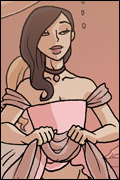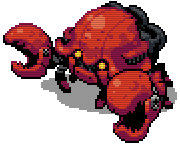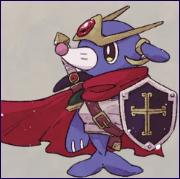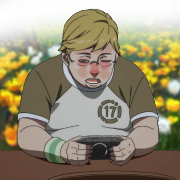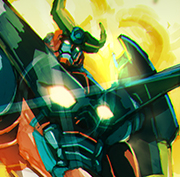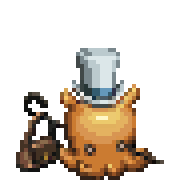|
PRADA SLUT posted:In the Pathfinder Adventure Card Game, I encounter a villain, defeat the villain, and he runs to another location and gets shuffled in to that deck (because there was an available location). Now, in that new location deck, there's a villain and a henchman both. If I defeat the henchman and close the location, I'm supposed to discard everything in that deck, but I notice the villain card is there. Do I just keep the villain there, with the location unclosed (meaning that the location deck is just one card, the villain), or does something different happen? Yes. You look through the location deck, pull out any villians, banish the rest of the cards then leave only the villians in the location deck with the location still open.
|
|
|
|

|
| # ? May 9, 2024 23:04 |
|
PRADA SLUT posted:In the Pathfinder Adventure Card Game, I encounter a villain, defeat the villain, and he runs to another location and gets shuffled in to that deck (because there was an available location). Now, in that new location deck, there's a villain and a henchman both. If I defeat the henchman and close the location, I'm supposed to discard everything in that deck, but I notice the villain card is there. Do I just keep the villain there, with the location unclosed (meaning that the location deck is just one card, the villain), or does something different happen? PFACG Rules, Page 13 posted:If you succeed at meeting the When Closing requirement, search through the location deck, take out any villains, and banish the other cards. Any villains you found become the entirety of the location deck, and the location is not closedóbut at least you know where the villains are! E:f;b
|
|
|
|
Big McHuge posted:I seriously think Uwe's next game is going to be about watching paint dry. Fresco is a Ruskowski/Süßelbeck game. It's a bit too intense for my tastes.
|
|
|
|
jmzero posted:I really like the Agricola app for this. I very rarely play it normally against the AI (the AI is kind of OK at 2 players, but is really weak after that), and even if I do I never play fair. I just repeat the draft until I get a bonkers combo. Like, with enough cards you get so you can build rooms for 1 wood each (and then you add plasterer + animal tamer so you can have a weird clay zoo) - or you ultra-stack one space so that every time you "take a grain" it's 5 grains, 2 vegetables, a food, you plow a field and build fences. I'm still trying to beat both opponents' combined scores in a 3-player LoW against AI. Many times I have beaten both by 100+ points and/or had double the worse player's score, but I haven't quite achieved my goal yet. Which goes to show how much better the LoW AI is than, say, Le Havre, where I was fairly quickly able to beat both opponents' combined score without ever taking a loan. After I managed that I kind of lost interest in setting myself "how badly can you clobber the AI" challenges for that game.
|
|
|
|
Rutibex posted:Your bro needs Agricola STAT  Seriously though for someone relatively new to the hobby, Caverna is a MUCH better intro to worker placement than Agricola. Better game overall for my money as well. Feels more like you're trying to win rather than desperately trying to not die.
|
|
|
|
The official word is that 1 Temporum expansion is complete and whether or not it gets released depends on sales. No further expansions for Temporum have even started development. (Keep in mind that the expansion-heavy DXV games often had the expansions planned long in advance, such as Dominion's initial "500 different cards" dev cycle)WhiteHowler posted:I accidentally spoiled myself on one of my Christmas presents, and it looks like I'm getting Tragedy Looper. For your first game of Tragedy Looper:
I'm beginning to let my players take notes during the game. If things get too easy for the protagonists, we can always lower the number of loops. People are less stressed out and have a more positive experience overall when they're not freaking out about forgetting things.
|
|
|
|
There is one thing I just remembered that I'm pretty sure we did wrong the first time: Don't forget that if an incident triggers (i.e. the culprit has enough paranoia) but the effect can't happen for some reason (e.g. there is no one in the right location to murder), you still have to announce that an incident "almost happened" or the like. It's easy to just clump "nothing happened because the culprit didn't have the paranoia" in with "nothing happened because there is no available victim" in the same category and just skip over the incident, but you do need to keep them apart because, well, that's extra information for the protagonists.
|
|
|
|
Is Agricola good 2 player? That might be a fun game to ease my gf into the board game thing.
|
|
|
|
goodness posted:Is Agricola good 2 player? That might be a fun game to ease my gf into the board game thing. I'd do All Creatures Big and Small for Agricola light for 2 players.
|
|
|
|
Lorini posted:I'd do All Creatures Big and Small for Agricola light for 2 players. Looks like the right choice. Anyone have a copy they want to sell  Does anyone here play online/Vassal board games? I am trying to find some good ones to try out.
|
|
|
|
goodness posted:Looks like the right choice. Anyone have a copy they want to sell You can have mine for $40 shipped. Includes the first expansion and you have to be in the US to take this offer, I don't ship outside of the US.
|
|
|
|
Lorini posted:You can have mine for $40 shipped. Includes the first expansion and you have to be in the US to take this offer, I don't ship outside of the US. pm'd you.
|
|
|
|
So like I was saying, this is the inside of the Temporum box: I just noticed that the meeple bag is not even resealable. They must have spent all the component money on the fuckoff huge tri-fold board (why does it need to be that big again?).
|
|
|
|
OmegaGoo posted:Please don't do this for a teaching game. This is FANTASTIC once everyone knows what they're doing, but do not do this against newbies. You will never play this game with them again. As I was reading the rest of the posts, I was planning to comment on this as well. Almost all the comments I read about Tragedy Looper is on how CRUSH the players, how to DESTROY them, how to NOT let them know ANYTHING at all. Which Masterminds handbook expressly advises against. I tells that the fun of the game is letting players to enjoy discovering things, figuring out parts of the story and then competing against them. Imagine a villain killing the protagonist of a story in the first minutes of the story. That wouldn't really be interesting. That is why most stories has villains toying with the protagonists, helping them along, giving them clues here and there and sabotaging their progress somewhere else. In the end, where is the fun in being the lonely bad guy who already won and has nothing to do anymore. Which is surely not the analogy of you being the guy who bought the game and now unable to find anyone to play with. echoMateria fucked around with this message at 01:32 on Dec 20, 2014 |
|
|
|
Elysium posted:So like I was saying, this is the inside of the Temporum box: Wow, really? Mine came with resealable bags. I know DXV was actually off-put by some of the components. The clock hands should have been way bigger, for example (see the back of the box). The board is just the right size for the cards and crowns, though. echoMateria posted:As I was reading the rest of the posts, I was planning to comment on this as well. Almost all the comments I read about Tragedy Looper is on how CRUSH the players, how to DESTROY them, how to NOT let them know ANYTHING at all. Which Masterminds handbook expressly advises against. I tells that the fun of the game is letting players to enjoy discovering things, figuring out parts of the story and then competing against them. This. The training scripts (1 and 2) are designed to let you beeline victory conditions as Mastermind while still having backups. If you do this, you leave a trail for the protagonists to follow, and everybody feels involved. If you make too much of a mess, they don't get any information, and then the whole thing feels frustrating and arbitrary. poo poo, script 2 especially is hard enough for the protagonists already. Broken Loose fucked around with this message at 01:39 on Dec 20, 2014 |
|
|
|
My box looks just like that, lack of resealable bags and all. It was poo poo, but not quite as poo poo as Pressure Cooker's box.
|
|
|
|
goodness posted:Is Agricola good 2 player? That might be a fun game to ease my gf into the board game thing. Agricola is a terrible first game. It's a great fourth or fifth game, but you'd be better off with almost anything. Agricola is a phenomenal game, but it's stressful, it's got an enormous amount of "stuff to do" for your turn, and the mechanics are completely nonintuitive to the "roll the dice do what the square says" crowd. Aside from Ticket To Ride and Carcassonne (which are both great), I like Takenoko. It's easy, it's cute (meaning it looks appealing, colorful pandas and bamboo and poo poo, instead of a bunch of tiny colored cubes), and it scales well enough that it's fun to play later on. It has dice rolling, which helps direct people, but it also unfolds nonlinearly, so there's decision making and planning, which preps people for games that remove the direction and random elements. PRADA SLUT fucked around with this message at 03:00 on Dec 20, 2014 |
|
|
|
Elysium posted:So like I was saying, this is the inside of the Temporum box: Yeah mine looked like that too, it's absurdly stupid. I can't believe it didn't come with any resealable bags at all the board owns though, please don't disrespect the board
|
|
|
|
It is my opinion that anyone trying to introduce someone (friend, spouse, etc) new to board games should select a game with these traits. Remember that these games are meant to get new people in to board games, not represent the pinnacle of game design or competitive viability or whatever. This is coming from the people who think that board game night is playing Monopoly and Yahtzee. Some element of randomness This could be dice rolling, card drawing, or the like. Essentially, there needs to be some element of luck involved. I know most players scoff at randomness, but it's actually a really good equalizer to making new players have a chance to win (or at least, to feel like they're still "in it"). Of course, the better player should be able to outplay a disadvantage (nobody is suggesting Candy Land), but it's a lot easier for new players to gain advantage, and easier for them to mentally displace a loss as bad luck, rather than them not getting some fundamental strategy. Think about how a loss would feel if you've got a Chess Elo of 1100 and you play against Kasparov, versus a loss playing blackjack. New players should feel like they have a way to compete with better players. For the teacher, these games also work well because you can ride your opponent a lot harder and the outcome will be much more even. Some people don't really like the feeling that you're just taking it easy on them, and if they win, it's just because you let them. Clearly defined turn strategy Good starter games should have a very easy, very specific goal for players do do on their turn. While every game has a goal (get the victory points of course, how do you not get it why is your turn taking 10 minutes), new players need guidance on exact course of action that they should do on their turn. For instance, a game like Lords of Waterdeep cuts the difficulty for a new player, since they look at their cards, and say "Oh, I need to accomplish these quests sitting in front of me for points, and to do that, I need to get three orange guys". Suddenly, a board with 20 possible actions on it seems manageable, since they know their goal for the turn is to "get orange guys". Compare that to Caylus, where the player just knows a bunch of things they should do at some point in time, but has no idea what to do at any given turn. Limited options Starter games should either give the player inherently few options, or should be directed enough that they can ignore a large number of options (see above) which don't make sense for their turn. Carcassonne is great because they draw a tile, then figure out where to place that one, single tile. Ticket to Ride is great because they can either draw cards or play cards, and they know that if they need to get from Dallas to Portland, they need to have a certain combination in-hand. Twilight Struggle is a bad starter game because the sheer volume of options, none of which are necessarily clearly better than any other. It's for this reason that I think a game like Ascension is better than a game like Dominion for new players. Ascension offers a "snapshot" strategy, where you play your hand, then look at the offering and draft from it, which changes every turn. Dominion--while a good game--is more of a "what the hell, how many of these drat things do I need and why are there so many piles of them" game. Tactics trumps strategy. Little snowballing Essentially, the early game options you take shouldn't have a large effect on the tempo of the game. For example, in a game like Agricola, one player can make sacrifices early game to be able to do literally three times what another person can do late-game, by having more family members (and more available actions). These risk/reward mechanics are great for games--just not for someone's first experience playing something. It's not fun to feel like someone has such an enormous mechanical advantage that it's not actually possible to catch up. It's a lot easier to look at the board state and go "well, I'm behind in points, but otherwise we are equal in what we can do". Snowballing happens in many games, but the important part is that it doesn't feel hopeless to the "behind" player. You can be behind in Ascension or something but still feel like you can get a handful of good draws and come back (see "randomness", above), much easier than you can be behind four family members and six plowed fields in Agricola and feel like the only chance of winning is if your opponent makes an uncharacteristic series of huge gently caress ups. A great visual style Good starter games generally have more polish. It's a lot easier to attract people to games that look good. Put Takenoko and Castles of Burgundy side by side and figure out which one gets the attention of new players (it's the one with the colorful pictures on the tiles, panda bear, and stackable bamboo chutes, not the one with a bunch of wooden discs and cardboard squares). While this might not have any effect on the game itself, it makes the game look way less intimidating, more tangible, and less abstract. Plus, it will keep peoples interest longer or make them want to pay more attention to what you're trying to explain. You win by winning yourself The opposite to this is winning by making the other person lose. There are a few games in which you can do this and still be "starter" games (King of Tokyo), but in general, you want a game in which players each compete to have the highest score, rather than try to eliminate everyone else from play. Hidden points mechanics can work out well in this sense too, where a player, even if they're behind, can at least feel like they've got some last-minute unaccounted for points that could turn the ending score in their favor. People remember the game of Ticket To Ride or Lords of Waterdeep where they were behind on the board, but just barely squeaked out the victory when all the cards were counted up. Even if it appears hopeless (Well I'm behind 20 points and I've only got 3 cards to their 6), as long as there's still the hope that they could come back is a worthwhile mechanic. PRADA SLUT fucked around with this message at 03:56 on Dec 20, 2014 |
|
|
|
Good post and good advice - maybe it should be put it in or near the OP?
|
|
|
|
Great post! I am new to board games myself, but have always been interested. I have just played Carcassone, Catan, Puerto Rico, Ticket to Ride, Munchkin. Basic stuff. I wish there was a board game rental system.
|
|
|
|
Do most players scoff at randomness? I was under the impression most people here favored it in most cases, assuming that it determines your options, rather than determining your success.
|
|
|
|
Countblanc posted:Do most players scoff at randomness? I was under the impression most people here favored it in most cases, assuming that it determines your options, rather than determining your success. How do Ascension and Innovation fall on that divide?
|
|
|
|
goodness posted:Great post! I am new to board games myself, but have always been interested. I have just played Carcassone, Catan, Puerto Rico, Ticket to Ride, Munchkin. Basic stuff. Some parts of the world have board game cafe's / stores, with dozens to hundreds of games opened up to play on the shelves. Dollar an hour per person or so rents you a table and you can try out whatever you want. Played tons and tons of different games to get a feel for what I like in a popular chain of stores in Taipei, Taiwan. Really, really miss it.
|
|
|
|
OmegaGoo posted:How do Ascension and Innovation fall on that divide? I've heard people (on this forum) raging at Ascension because they think the mechanic of being able to buy two cards in a row is completely unfair and offers such an insurmountable advantage the entire game is nothing but a coin flip. Of course, notwithstanding that there's just as much chance of something good on the flop as something lovely, and that either player has the exact same chances to have any given card flop. Also ignoring fact that what you can (or can't) acquire has to do with what you've been drafting in your deck all game, and your ability to (or to not) acquire a specific card is dependent exactly what you draw that turn, but I guess all those things aren't considered "random". Just the main deck conspiring against you. I think it's just a different kind of randomness than what people are used to, because it's more visible. It's visible to have your opponent take a card you want before you get a chance to, it's not as visible when you shuffle your deck and you get a lovely draw Dominion because you don't feel like you've lost an opportunity. The takeaway is that some people absolutely despise mechanics that can somehow offer asymmetrical advantage and disadvantage, and perceive it as an unfair mechanic. Some people don't like working under the "good enough" constraints of what you've got to work with that turn, or with a less-than-ideal board. Some people can't stand the idea that their opponent can get something that they will no longer be able to get. PRADA SLUT fucked around with this message at 06:24 on Dec 20, 2014 |
|
|
|
PRADA SLUT posted:Of course, notwithstanding that there's just as much chance of something good on the flop as something lovely, and that either player has the exact same chances to have any given card flop
|
|
|
|
You know, it's almost a good point. Ascension could be fun if you played a series of games so that people's luck had a chance to even out. Playing for money would probably heighten the experience. And each game should last like 2 minutes.
|
|
|
|
Poopy Palpy posted:You know, it's almost a good point. Ascension could be fun if you played a series of games so that people's luck had a chance to even out. Playing for money would probably heighten the experience. And each game should last like 2 minutes. So, in games that are heavily luck based, we should play sets of games, and add in the Backgammon doubling cube?
|
|
|
|
Randomness needs to be used judiciously and with a deft touch. Randomness in setup/start condition is awesome, as it extends the life of the game. Randomness in allocation of powers and capabilities is annoying as gently caress - any time you're reliant on hoping to randomly pull the 'I win' card from a shared deck, you may as well have rolled a dice at the beginning and declared a winner then and there.
|
|
|
|
I can't agree with the choice of Ascension over Dominion based on the criteria that was laid out. Ascension's rotating card offer has got to be more confusing with a constant slew of new choices compared to Dominion's static 10 card selection. Plus Dominion has decent and reliable standbys to purchase (i.e. silver) that grant some progress if you're completely unsure for your turn. Big money is a simple and easy first time strategy (albeit boring). Ascension has like 50+ different cards coming out. It's hard to know what's good and then try introducing the idea of common/uncommon/rare cards.
|
|
|
|
PRADA SLUT posted:Lots of wrong words. Consider the following. There are two different types of randomness in board games: the type that drives strategy (good), and the type that invalidates it (bad). To give examples of these two types, let's take a look at Cyclades. Cyclades has two distinct random elements: a combat die that resolves fights between armies and navies, and a deck of monster cards that give players single-use powers when purchased. Now, it is a common viewpoint among those you criticize that dice generally fall into the category of bad randomization, while cards more often a form of good randomization (when designed properly). In Cyclades, however, I am of the opinion that the opposite is true. The combat die, due to how combat is resolved as well as its low variance (0-3 on a d6, with double 1s and 2s) does not randomly determine winners as much as it heavily incentivizes players not attacking unless they have a 2+ point advantage (at which victory is almost a sure bet), while still allowing the option for a high-risk high-reward Hail Mary attacks. To me, this makes the combat die a good form of randomization, because it drives the players decisions through the game. The monster deck, however, is a random assortment of one-shot powers. Some of the powers are useless if they come out too early, too late, or without certain other cards. Others are so powerful that they can single-handed win the game by overriding the main flow of the game. In fact, nearly every game of Cyclades I've played has been won either by the player who simply had the most cash on hand the turn one of those cards came out (after enough metropolises where on the board for winning to be possible), or the player who simply noticed that they could immediately snatch victory with that card while no one else did. This is bad randomization, because you can't build a working strategy around something that can potentially break any rule in the game, and it can easily determine the winner to be not the person who played the best, but the person who happened to be at the right place at the right time. Now, let's tie this back to Ascension by identifying the two random elements in that game; your deck, and the central market deck. Of these two, the randomness is the individual player's deck is what it shares with Dominion, and this is what I would classify as 'good'. It is good randomization because the entire strategy of both games is driven by trying to manipulate this randomizer into a lean, powerful, and reliable engine. Every decision you make has to be made with that goal in mind, and the chance of your deck sputtering every now and again is what drives you to constantly improve it (and in Dominion's case, the fact that scoring mean deliberately sabotaging your own engine forces you to think carefully as to what Victory cards to purchase and when). Ascension's central market deck, however, is 'bad', just as it is in every other game that uses one. It is bad because it does not drive or direct your strategy, it stifles it. Did you choose a rune heavy strategy only to have the central row be nothing by monsters for several straight turns? Or did you go Power-heavy and end up with a dry spell of monsters, forcing you to waste it on lovely Cultists? Oh, you were looking to trim down your deck with banishers, or go for a Mechana synergy strategy, only to never have a chance because they were all drawn after your turn, but acquired before it got back to you? Sucks to be you, dude! It has nothing to do with 'asymmetrical advantage and disadvantage', it's about having the decisions you make though out the game matter, by allowing them to have a effect on the outcome, instead of having them invalidated, or even prevented, by a glorified RNG. It's about being able to play the game, instead of having the game play you.
|
|
|
|
Just brought Star Realms to the table for the first time. It went over well. One of the guys reminded me that it's more like Ascension than Dominion, That took me back, since it's been a while since I played Ascension. That and all this Ascension talk makes me think that I wouldn't bother playing Ascension again after playing Star Realms. All the extra flummery in it just doesn't do it for me. Star Realms is simple and clean. This game means you can have your asymmetrical common-market luck-dependent deckbuilder (that still isn't as good as Dominion, but what is?), in a lighter package (physically, gameplay, and also in cash outlay). e: VVV That thing about The Blob was one of the player's first impression too, but I dunno: I think the Machine Cult are bonkers soup to nuts. Magnetic North fucked around with this message at 07:49 on Dec 20, 2014 |
|
|
|
Star Realms is pretty much strictly better because the game will be over faster, so your luck actually gets the chance to even out. e: That being said, the blob synergy bonuses seem way, way better than everyone elses.
|
|
|
|
Played Colt Express tonight and loved it! Beautiful art and a fun strategic element, kind of a western themed Robo-Rally. Due to the small nature of the train (2 decks, 10-12 total spaces?), I'd need to come up with variants to keep it fresh, but it seems good for 2-3 more plays. "Concept" was a great game when we played a variant: How many clues can you get the rest of the table to guess in 5 minutes? I blew the crowd away with 4/5. (Someone guessed "Sauna/Hot Tub" instead of "Bath Tub" but I think it's close enough). (This was after wasting 20 minutes trying to get someone to explain "Indiana Jones", which I was able to give in five clues: [Movie/Male Person/Fictional, Uses Weapon/Spiral. If there's a dullard at your table they WILL take forever to get a concept across, whereas quick, clever players will spend less time as a clue giver according to the core rules.]
|
|
|
|
They're mostly generic games, but Amazon's got some lightning deals tomorrow (west coast time): 6:00 am - Munchkin 5 de-ranged [6.214] ($15.42) 7:00 am - Car Wars [6.055] ($15.14) 8:00 am - Sorry [4.643] ($21.73) 8:00 am - Resistance [7.416] ($14.09) 9:00 am - Boggle jr [5.359] ($14.67) 9:00 am - Rummikub large letter edition [6.135] ($20.71) 9:30 am - 5 Second Rule [5.519] ($25.00) 10:00 am - Hi Ho Cherry-O [4.487] ($6.69) 10:00 am - Clue [5.550] ($17.70) 11:00 am - Scrabble Deluxe [6.291] ($29.56) 11:00 am - Disney Sofia Monopoly Jr [4.407] ($9.95) 12:00 pm - Candy Land Disney Princess Ed. [3.665] ($13.99) 1:00 pm - Sons of Anarchy [6.003] ($30.21) 2:00 pm - Illuminati [6.010] ($23.77) 2:00 pm - Trouble [4.177] ($13.14) 3:00 pm - Chutes and Ladders[3.401] ($9.80) 3:00 pm - Rise of Augustus [6.683] ($23.05) 3:00 pm - Ouija [] ($13.85) 4:00 pm - Spongebob Operation [4.361] ($21.99) 4:00 pm - Nations [7.609] ($46.99) 5:00 pm - Spongebob Monopoly [4.407] ($21.99) 5:00 pm - Disney Planes Chutes & Ladders [3.401] ($15.43) 5:00 pm - Zombie Dice [6.200] ($10.72) 6:00 pm - Zombie Fluxx [6.004] (12.55) 7:00 pm - Eclipse Rise of the Ancients ($30.20) 8:00 pm - Munchkin Cthulu ($18.34) Prices are current BGG prices, not what Amazon will be selling them for, for comparison. Paper Kaiju posted:Ascension's central market deck, however, is 'bad', just as it is in every other game that uses one. It is bad because it does not drive or direct your strategy, it stifles it. Did you choose a rune heavy strategy only to have the central row be nothing by monsters for several straight turns? Or did you go Power-heavy and end up with a dry spell of monsters, forcing you to waste it on lovely Cultists? Oh, you were looking to trim down your deck with banishers, or go for a Mechana synergy strategy, only to never have a chance because they were all drawn after your turn, but acquired before it got back to you? Sucks to be you, dude! That just forces you to play a balanced game. You want to play greedy and throw everything you've got behind one strategy, that's fine, but you risk getting wrecked by something else. If you load up on nothing but power and then a few flops happen where there's nothing to use it on, you can cry about deck RNG conspiring against you, or you can be like "well gently caress, probably should have diversified my deck a bit more the past 5 turns". That's the point of playing tactics is that you don't know what board state you're going to find yourself in, you can either play greedy and go for one strategy only (which will cause you to lose in certain board states), or you can diversify to hedge against other possible board states, at the cost of a less synergistic strategy. It's not that one type of game is better or worse than another, but you can't approach them with the same mindset when you play. In one, things are controlled, things are planned, and it's a very structured, organized outcome. The cards will be the same, you always have the opportunity to get them, and things otherwise remain very constant, which allows you to build some sort of grand architecture of strategy. In another, it's unpredictable what situation you're going to find yourself in turn-to-turn and you have to balance between a greedy and a diversified strategy to put you in the best position for the unknown turns to come. You might have draws in which you want both of, but can only take one, or weighing a card your opponent might want, versus its usefulness to you, or leaving a board in the state that is disadvantageous to your opponent, versus gobbling up every last card you can get. Cocks Cable posted:I can't agree with the choice of Ascension over Dominion based on the criteria that was laid out. Ascension's rotating card offer has got to be more confusing with a constant slew of new choices compared to Dominion's static 10 card selection. Plus Dominion has decent and reliable standbys to purchase (i.e. silver) that grant some progress if you're completely unsure for your turn. Big money is a simple and easy first time strategy (albeit boring). Ascension has like 50+ different cards coming out. It's hard to know what's good and then try introducing the idea of common/uncommon/rare cards. I should clarify why I put Ascension instead of Dominion (though any similar game could work). For a new player, you basically tell them "okay, heres 5 cards. Pick the one(s) you want, that you have the resources for." Each turn the five cards are different, so every turn, they have something new to look at, instead of the same 10 piles of cards that slowly deplete. For one, it cuts the decision-making in half, since they only have to worry about 5 cards (and they don't need to worry about memorizing them or anything since they can just read as they go). It also keeps them from worrying about what sort of balance of multiple cards they need, since once you take a card (aside from the basic resource cards), it's gone from play and a new card replaces it. This also gives the feeling that each persons deck is unique, instead of having them trying to emulate the draws you pick (which happens sometimes.. new players just do whatever they think the person who knows how to play does). Also, the "honor" (point) system gives you points as the game goes on, instead of both players having "zero" points and then getting a giant wad at the end. This makes it easier for people to determine the relative positions of everyone during the game. Imagine Ticket To Ride if there was no scoring of routes in the middle of the game, you just counted up everything at the end instead. It's a lot easier for new players to wrap their heads around a game where you always know who's in first, second, last, etc (even if there are hidden points at the end). I've had far more (brand new) people get drawn to Ascension than I have any other similar card game, as well. The downsides I noticed about Dominion (Thunderstone, etc), was that there was just a bit too much to choose from, and no real way of determining the metric of success. How many points do I have? Who's ahead? Is this the right play? What do I directly gain from this? Again, this is not about which game is "better", or which game is more deep or appealing to "gamers", it's just my rationale for why games with certain mechanics tend to be better at introducing brand new players to the game. I'm not claiming Ascension is the greatest deckbuilder of all time (it isn't), it just happens to be one of the card games with many mechanics that are easy for new players to get in to, though there are others as well that could easily be used instead. PRADA SLUT fucked around with this message at 09:22 on Dec 20, 2014 |
|
|
|
Dual resource systems within a deckbuilder are always bad.It doesn't matter if you balance your deck or not and actually balancing your deck is detrimental because it just leads to situations in which you end up with an even number of resources, which is always bad in a single hand. And if you specialise, you can potentially get screwed as per the examples given by other players. If there was a single resource system, the random central market would not be as bad. If you really want to get people into Deckbuilders, forget Dominion, forget Ascension. If people really are newbies to the hobby, get Salmon Run 
|
|
|
|
Zveroboy posted:This might be a long shot but I thought I'd ask. My girlfriend's mum is looking for something for Christmas for her son. The right answer here is Archipelago + solo expansion cards. The solo variant is a completely different approach to the laid-back 4X multiplayer game; They made it so you had very very little time to fulfill win conditions that were already hard to acheive in the first place (ok, gathering 15 wood is not tough stuff, but gathering 15 wood in four turns as you start in the middle of the ocean with 2 meeples is holy poo poo hard). It's actually much less forgiving than Mage Knight solo. It's also rewarding, pretty, varied, and absolutely fits the puzzle criteria as a solo game. I need to track my copy down now..
|
|
|
|
Picked up and played Castles of Mad King Ludwig tonight (2p only unfortunately). Really have to agree with what everyone had been saying, this was such a fun game and I can't wait to play it with more people. I'd never played Suburbia before but my opponent had, and he had pretty ho-hum things to say about it, but came away from Castles beaming about our ridiculous castles and had a good laugh as we went through the remaining room tiles we didn't use and saw what some of them were. If I have anything negative to say it's that I think the rule book is laid out pretty poorly, with multiple cases in my first pass through it in which things are referenced before those things are actually explained/introduced. There were also a few parts which, while ultimately we got figured out correctly (to our knowledge), were worded very poorly and were a bit confusing. Definitely think this one is better suited learning from an experienced player if possible, but at the end of the day it's s minor squabble.
|
|
|
|
Tekopo posted:Dual resource systems within a deckbuilder are always bad.It doesn't matter if you balance your deck or not and actually balancing your deck is detrimental because it just leads to situations in which you end up with an even number of resources, which is always bad in a single hand. And if you specialise, you can potentially get screwed as per the examples given by other players. If there was a single resource system, the random central market would not be as bad. Dominion is still the best first deckbuilder for the same reason it's by far the best deckbuilder. The First Game setup is still the best way to teach deckbuilders to anybody. The only true multi-resource system I've seen not be complete rear end is that of Eminent Domain. The reason it works is because in any multi-resource DB you're completely hosed if your hand is split between resources, but in EmiDo a split hand usually leads to multiple actions between turns. If a half fight/half cash hand meant taking 2 potential turns in a row in Thunderstone/Ascension/Resident Evil/Goblin Stacker/whatever the gently caress, then you'd have way less of a poo poo time due to the luck of the draw. Puzzle Strike comes kind of close, but that game manages to segregate the two halves of its economy in an almost, but not quite, elegant manner. It's not so much multiple resources as it is multiple axes. Parade markets are still universally terrible, though.
|
|
|
|

|
| # ? May 9, 2024 23:04 |
|
Paper Kaiju posted:The monster deck, however, is a random assortment of one-shot powers. Some of the powers are useless if they come out too early, too late, or without certain other cards. Others are so powerful that they can single-handed win the game by overriding the main flow of the game. In fact, nearly every game of Cyclades I've played has been won either by the player who simply had the most cash on hand the turn one of those cards came out (after enough metropolises where on the board for winning to be possible), or the player who simply noticed that they could immediately snatch victory with that card while no one else did. This is bad randomization, because you can't build a working strategy around something that can potentially break any rule in the game, and it can easily determine the winner to be not the person who played the best, but the person who happened to be at the right place at the right time. Not disagreeing with this, but it's somewhat mitigated by monsters only being able to be bought in order of the gods that turn, which can force some strategic bidding if people see the game-winning strategy for a person with it. Of course, considering how many "out of nowhere" victories I've seen with the game, it's still a valid complaint. I love the game, but man does it require you to have a really good understanding of what's going on with everyone on the board to win. I just bought the Creatures Crossover Cyclades / Kemet pack, and though I haven't tried it yet, is it just me or does the Cyclades part break the game? The Kemet creatures end up being units with special abilities, but the crazy part is that on your turn you can spend 1 gold to move a unit just like with Ares. Suddenly Ares is a lot less valuable to whoever has a Kemet creature, and considering the luck of the draw and how quickly Cyclades games can end, one or maybe two players will have a really big advantage since they don't have to save up a ton of money to bid on Ares at a key moment. Anyone have any hands-on experience with the Cyclades part of the expansion that could clarify how big a deal it is? Also, what do the Cyclades expansions add and how good are they? May try to convince my friend who owns the game to pick them up even though we don't play Cyclades often enough.
|
|
|






